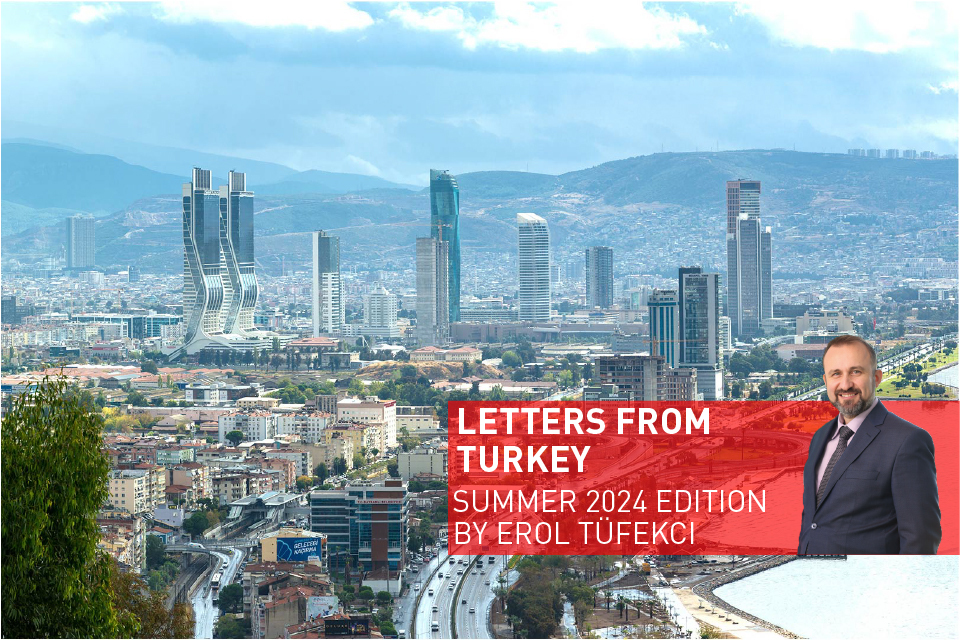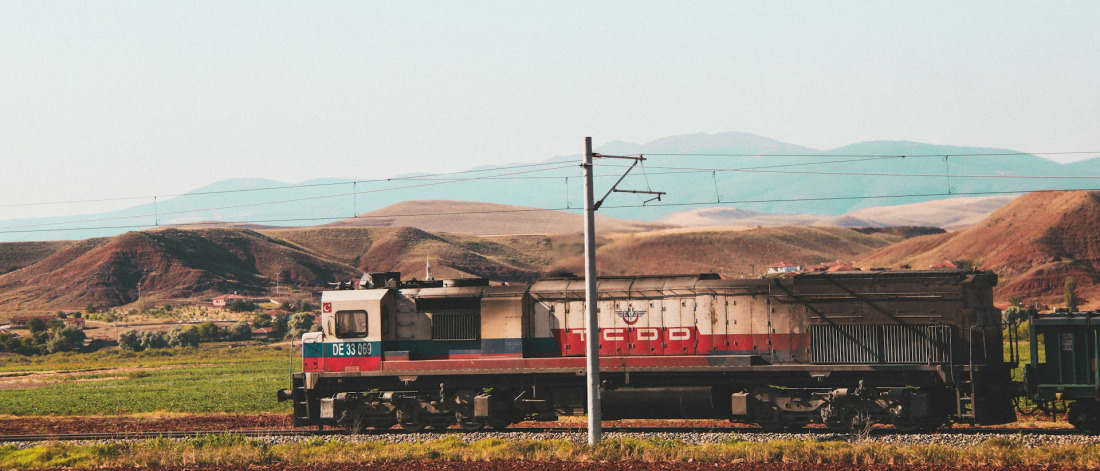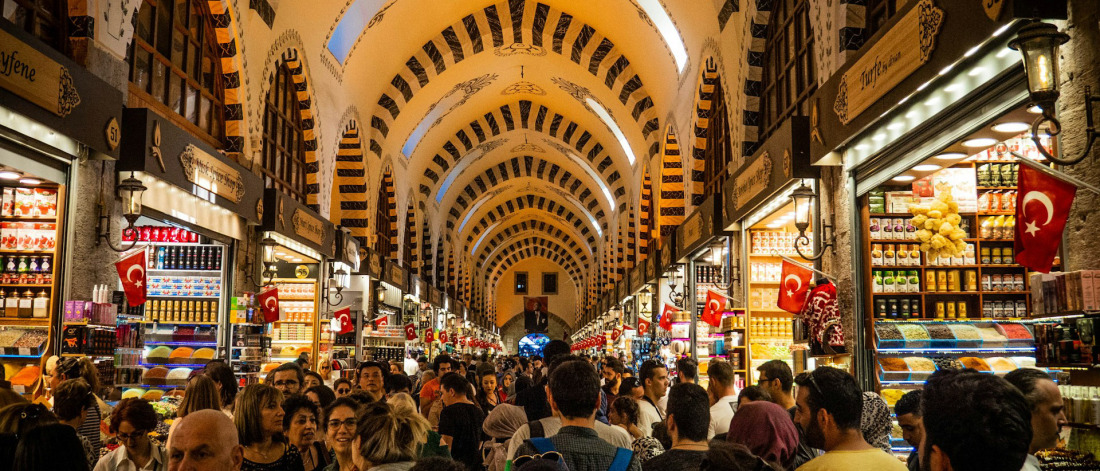Letters from Türkiye: Summer 2024 edition
Letters from ...Facts and information about business and investments in Türkiye

Türkiye has discovered railways and is building on infrastructure. A way to greater resilience and a path out of the crisis? And ... how Bremen is refocussing its economic development strategy in Türkiye.
You'll find all this and more in our summer 2024 country report. Erol Tüfekҫi, Director of the Bremeninvest offices reports directly from the port city of Izmir, sending quarterly overviews of the trends, opportunities and new developments in Türkiye.
Türkiye is getting its railways back on track

Türkiye is a country of truck transport. The average lorry journey is twice as long as in the EU (282 kilometres compared to 135 kilometres) and only around five percent of all freight is transported by rail (in Germany, it's 19 percent). This means the country is failing to exploit a great deal of economic potential, because freight transported by HGV in Türkiye costs around 2.5 times more than goods transported by train, produces significantly more emissions and requires more people. With a total rail network of 13,900 kilometres, Türkiye is much less well-connected than Germany (the German rail network is 33,000 kilometres long in a country half the size of Türkiye).
It's high time that freight transport was moved onto the railway. And the Turkish Government has recognised this. It is currently funding a multitude of large-scale and smaller-scale projects. An example is the construction of a rail link along the Northern Turkish border to Georgia and the Caucasian Republics. In the South, a new economic corridor to Iraq is being built, with the aim of improving connections to the Gulf States and to Asia. This is part of a multi-national, 20 billion dollar project that will see the construction of new infrastructure between the Gulf States and Türkiye before 2038. New high-speed stretches for passenger transport are also being built in a number of places. In total, according to the Traffic and Logistics Master Plan, the rail network will double in size to 28,590 kilometres and the freight transport network will be five times larger by 2053.
In conjunction with this, investment in infrastructure will grow by up to 50 percent, compared to today's figures. This is not only an opportunity for investors and rail companies but also for the globally active logistics companies that are currently based in Türkiye, which will be able to improve their efficiency thanks to these developments. At present, the lack of both actual railway lines and their associated infrastructure is still a huge problem. Many places simply do not have efficient transhipment terminals or logistics centres, which are the vital link between road, rail and maritime transport. Even the production plants operated by major vehicle manufacturers are not connected to the rail network.
However, the first projects to remedy this problem are already underway. For example, the Izmir Kemalpasa Logistics Center is currently taking shape in the Turkish maritime port of Izmir. The first construction phase of this project will cover 1.2 million square metres and the second will extend up to 2.7 million square metres. The aim is to encourage and increase rail transport in the Izmir region. Together with the numerous planned rail links, which will connect the harbour with the hinterland (a connection that is, as yet, still missing), this will form a new transportation corridor from the Mediterranean to the Turkish hinterland. The planned connection with Iraq, up to the Iraqi port of Basra in the Persian Gulf, will provide an alternative to sending freight through the Suez Canal and also create a link to the New Silk Road.
Inflation: is the end in sight?

The continued high inflation rate has already been mentioned in a number of Letters from Türkiye. At present, it is at 67 percent (the official figure), and remains stubbornly high – with the associated effects on the lives of Türkiye's citizens. Despite its pervasive negative effects, Erdoğan's government has long held onto a strategy of promoting economic growth rather than fighting inflation. However, there are signs that these policies are beginning reconsidered. As the base interest rate rose to its current level of 50 percent, the Turkish Central Bank has been implementing counter-inflationary measures since June 2023. According to Erdoğan, the second half of 2024 will see developments in a deflationary direction.
This will have direct effects on anticipated economic growth, which is predicted to be significantly lower than before in the coming years. Private consumer spending is also forecast to be lower, after having been a driving force of the economy in the past, thanks to repeated increases in the minimum wage and the fact that the people of Türkiye have hardly been able to put aside savings in Lira without seeing their nest eggs evaporate almost immediately. Confidence in the currency is low.
However, despite these rather gloomy prospects, high levels of political uncertainty and Türkiye's increasing dependence on foreign financiers caused by growing foreign debts, the atmosphere among German and Turkish businesses remains good. The findings of a German Chamber of Industry and Commerce survey in October 2023 revealed that 67 percent of the companies that responded assessed their business outlook as good and had a positive view of the future. This should certainly be the case for exporting companies, which benefit from the relatively inexpensive Turkish Lira. However, there are other factors such as a young population, investments in an improving infrastructure and a large sales market that will continue to make Türkiye attractive.
Bremeninvest working together with the Uzuner Competence Group in Izmir

Here are some reasons which also encourage the Federal State of Bremen to continue its involvement in Türkiye. Bremeninvest has been working in Türkiye actively since 2011. However, things are about to change: in future, Bremeninvest will work together with the Bremen company Uzuner Consulting, as part of the Uzuner Competence Group, to attract Turkish companies to set up in Bremen and to expand its existing target groups.
With a workforce of over 300 staff, the Uzuner Competence Group offers IT consulting services in the areas of process optimisation and project management, digitalisation and software development. Headquartered in Bremen, the group has subsidiaries in Hamburg, Istanbul and Izmir. Uzuner's Izmir office is located in the "Teknopark İzmir", an industrial estate that is home to a multitude of companies involved in the technology and service provision industries.
As Bülent Uzuner, CEO of the Uzuner Competence Group said, "Bremen is often underestimated as a business location. For Turkish companies, especially those from the Izmir metropolitan area, Bremen's excellent infrastructure, its universities and technical universities and its reputation as a small, but extremely well-connected Federal State make it the ideal location in Germany. The technology park offers outstanding opportunities and potential for synergies, especially for IT companies. It can easily be a springboard for these companies and their highly qualified employees for accessing Europe. We are convinced that, by working with Bremeninvest (WFB) in the coming years, we will help facilitate a number of interesting relocations to Bremen".
Success Stories
Bremen’s Economy in Figures: Statistics 2025
The State of Bremen is a strong economic hub. A look at the latest statistics highlights its economic strength — summarising key data such as cargo volumes, export performance, industry turnover, and more.
Learn moreMedium-Sized Companies in Bremen Showcasing the Full Range of the Local Economy
Medium-sized companies form the backbone of Bremen’s economy. They create jobs and produce goods that are in demand worldwide. Here is a selection of ten businesses that illustrate the diversity of Bremen’s economic landscape.
Learn moreTwelve international food and beverage companies in Bremen
Becks and Melitta may be high-profile brands, but international food and beverage companies also manufacture lots of other products in Bremen and Bremerhaven. Here are twelve examples.
Learn more
